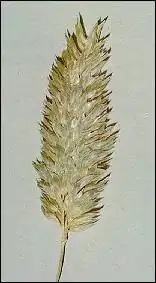Phalaris caroliniana
Phalaris caroliniana is a species of grass known as Carolina canarygrass and maygrass. It is native to the southern United States,[1] and it can be found as a naturalized species along the west coast of the United States,[2] as well as northern Mexico and parts of Europe and Australia. It is most often found in moist to wet habitats, such as marshy meadows, and it can thrive in disturbed areas. It is an annual grass reaching a maximum height between 1 and 1.5 m (3.3 and 4.9 ft). The hairy inflorescence is roughly oval in shape and up to 7 cm (2.8 in) long by 2 cm (0.79 in) wide.
| Phalaris caroliniana | |
|---|---|
 | |
| Scientific classification | |
| Kingdom: | Plantae |
| Clade: | Tracheophytes |
| Clade: | Angiosperms |
| Clade: | Monocots |
| Clade: | Commelinids |
| Order: | Poales |
| Family: | Poaceae |
| Subfamily: | Pooideae |
| Genus: | Phalaris |
| Species: | P. caroliniana |
| Binomial name | |
| Phalaris caroliniana | |
This grass probably made up part of the diet of prehistoric natives as one of several plants in the Eastern Agricultural Complex. Its grains have been identified in archaeological sites from Texas to Indiana to Alabama which may be four millennia old.[3] Laboratory analysis of the grass seed indicates that it is quite nutritious, with a good amount of vitamins and minerals.[4]
References
- USDA Plants Profile: Phalaris caroliniana
- "Phalaris caroliniana". www.calflora.org. Calflora. Retrieved 1 October 2019.
- Roberts, K. M. Phalaris caroliniana. Archived 2010-07-06 at the Wayback Machine Laboratory Guide To Archaeological Plant Remains From Eastern North America. Washington University St. Louis.
- Crites, G. D. & R. D. Terry. (1984). Nutritive value of maygrass, Phalaris caroliniana. Economic Botany 38:1 114-20.
External links